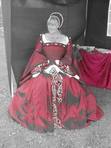Judith Arnopp's Blog, page 30
May 18, 2020
A FREE paperback about Anne Boleyn to mark the anniversary of her death.
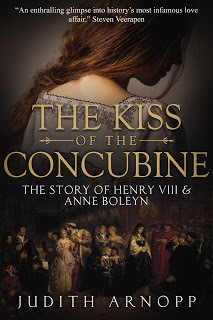
The KissofThe Concubine
Judith Arnopp
28th January 1547 – Whitehall Palace
It is almost midnight and January has Whitehall Palace clenched in its wintery fist. The gardens are rimed with frost, the casements glazed with ice. Like a shadow, I wait alone by the window in the silver-blue moonlight, my eye fixed on the bed.
The room is crowded, yet nobody speaks.
I tread softly among them. The flickering torchlight illuminates a sheen of anticipation on their faces, the rank odour of their uncertainty rising in a suffocating fug. Few can remember the time that went before, and both friend and foe balance upon the cusp of change, and tremble at the terror of the unknown.
I move through the heavily perfumed air, brush aside jewelled velvet sleeves. At the high-canopied bed I sink to my knees and observe his face for a long moment. He is changed. This is not the man I used to know.
They have propped him on pillows, the vast belly mountainous beneath the counterpane, and the yellow skin of mortality’s mask is drawn tightly across his cheeks. There is not much time and before death can wipe his memory clean, I speak suddenly into his ear, a whisper meant only for him. “Henry!”
The king’s eyes fly open and his eyeballs swivel from side to side, his disintegrating ego peering as if through the slits in a mummer’s mask.
He knows me, and understands why I have come.
He whimpers like a frightened child and Anthony Denny steps forward and leans over the bed. “Your Majesty, Archbishop Cranmer has been summoned; he cannot be long now.”
Henry’s fat fingers tremble as he grips the coverlet, his pale lips coated with thick spittle as he tries to speak. I move closer, my face almost touching his, and the last rancid dregs of his breath engulf me. “They think you fear death, Henry. But you fear me more, don’t you, my Lord?”
“Anne?”
The sound is unintelligible, both a denial and a greeting, but it tells me what I need to know. He recognises and fears my presence. Those assembled begin to mutter that the king is raving, talking with shadows.
I sink into the mattress beside him and curl my body around his bulk. “How many times did we share this bed, Henry?” His breathing is laboured now and sweat drips from his brow, the stench of his fear exceeded only by that of his festering thigh. I tighten my grip upon him. “Did you ever love me, Henry? Oh, I know that you lusted but that isn’t the same. Do you remember how you burned for me, right to the end?”
I reach out to run my fingertip along his cheek and he leaps in fright, like a great fish floundering on a line, caught in a net of his own devising. One brave attendant steps forward to mop the king’s brow as I continue to tease.
“Poor Henry. Are you afraid even now of your own sins? To win me you broke from Rome, although in your heart you never wanted to. Even the destruction of a thousand years of worship was a small price to pay to have me in your bed, wasn’t it?”
Henry sucks in air and forgets to breathe again. A physician hurries forward, pushes the attendant aside and with great daring, lifts the king’s right eyelid. Henry jerks his head away and the doctor snatches back his hand as if it has been scalded.
Even now they are fearful of him. Although the king can no longer so much as raise his head from his pillow, they still cower. How long will it take for them to forget their fear?
Mumbling apologies, the physician bows and backs away to take his place with the others. As they watch and wait a little longer, the sound of mumbled prayer increases. “Not long now, Henry,” I whisper like a lover. “It is almost over.”
A door opens. Cold air rushes into the stifling chamber and Archbishop Cranmer enters, stamping his feet to dislodge the snow from his boots. He hands his outer clothes to a servant before pushing through the crowd to approach the bed, his Bible tucked beneath his arm.
I playfully poke the end of Henry’s nose. “Time to confess your sins, my husband.” Cranmer takes the king’s hand, his long slim fingers contrasting with the short swollen digits of his monarch. As he begins to mutter the last rites, I put my mouth close to Henry’s ear to taunt him. “Tell the truth, Hal. Own up to all the lies you told; how you murdered and how you cheated. Go on ….”
But King Henry has lost the power of speech, and cannot make a full confession. Gasping for one more breath he clings tightly to Cranmer’s hand, and I know there is not long to wait before he is mine again. A single tear trickles from the corner of his eye to be lost upon his pillow.
“It’s time, Henry,” I whisper. “And I am here, waiting. For a few short years I showed you Paradise and now, perhaps, I can do so again. Unless, of course, I choose to show you Hell.”
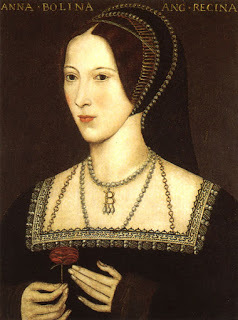
15221 - Hever, Kent England seems small after the glories of the French court, and my father’s house cramped and inconvenient. I am horribly bored kicking my heels in the country, and long for company. Mother is distracted, Father wears a face like a thundercloud, and neither of them pays my arrival home as much heed as I would like. There is no one save George, who is home for a few days.My brother is always glad to listen to me and pretends to delight in the stories of my adventures overseas. “You do look fine, Anne,” he says, admiring my fine French-styled clothes. I have grown used to admiration and whereas once I would have blushed and dismissed his words, I am far too elegant to let my discomposure show now I am older. George takes my arm and leads me inside, the interior of the hall suddenly dark after the brilliance of the day. “Have you heard about Mary?” he whispers.My sister, Mary, has ever had the knack of stealing the attention from me, and is the centre of things once more. She almost brought disgrace on us by sharing the bed of the French king, but Father has recently managed to marry her off respectably to William Carey. We all imagined that now she was safely wed to a good man, she would settle down to provide Will with a string of infants. But although my parents have not spoken to me of it, I have lately learned that Mary is now enjoying a passionate ‘flirtation’ with King Henry. My sister, it seems, accumulates kings as one might collect butterflies, or compliments.After supper, George and I closet ourselves in a small chamber where I poke the slumbering fire back to life. “You can’t blame the king for fancying her, she is so pretty. Not cursed with my long nose and bony chin.”George laughs and stretches his feet toward the flames. “If I didn’t know you better, Anne, I’d think you were fishing for compliments when you know very well that what you lack in looks, you make up for with wit.” He is right; my face does lack Mary’s softness. Her expression is meek, just as men prefer. To make it worse, she boasts a nature twice as soft as mine. Although I tell myself I’d rather have brains than looks, I don’t want to hear confirmation of my lack of beauty, even if it is only from the lips of my brother. I throw a cushion at his head, but he catches it deftly and laughs at me. “Poor Anne,” he teases, “is it a sweetheart you are lacking? Don’t worry, sister, soon there will be courtiers aplenty fighting for your favour.”I try to stop the hot blood from burning my cheeks. “I don’t need a sweetheart. Father is arranging my marriage as we speak, as well you know.”I am intended for James Butler, the heir of the Ormond estates, but his father and mine spend overmuch time quibbling over details, protracting the arrangement and leaving me in limbo. Although I have never set eyes on James, I am content with the match. He is young and rich enough to make a good husband, and I have heard no ill stories of him. I trust my father to choose well for me.George leans forward and offers me a handful of nuts. I pop two into my cheek, continuing to speak with my mouth full. “Can you imagine Mary in the arms of the king? I am surprised she can think of a thing to say.”“He won’t care what she says as long as it’s yes.” George laughs, his eyes glinting in the firelight. He watches me, aware that he has planted unmaidenly pictures in my mind. I have heard that my brother has a way with women, and I can believe the tales. He is good looking, dark like myself but with Mary’s features; a goodly combination for a man. Both Mary and George, it seems, are irresistible to the opposite sex, while I myself have not yet been tempted by any, despite the licentiousness of the French court. Perhaps my reluctance shows; perhaps there is something about me that promises rejection. Whatever the reason, I have never been tempted or even yet kissed; perhaps if I had been, I would have a little more understanding of my sister.If I were indelicate enough to imagine Mary in a dalliance with any man, I could not visualise her ever refusing. She isn’t the sort to say no. And by that I do not mean that she is in any way cheap, only that her gentleness makes her wary of hurting a fellow’s feelings.“Anyway,” George continues, “as I said, you can’t blame a man for trying, not when the prize is so full of sweet promise.” Trying to ignore George’s crude inferences, I force my thoughts toward Mary’s husband. “My sympathies are with poor William. How hard it must be for him to be made so publically a cuckold. What must he be feeling? They’ve only been married a few months.” “Well, be fair, Anne. He isn’t the first man to be so used and besides, we don’t even know if the king has so honoured Mary. She might well fend him off and cling to her reputation yet. Although, on the other hand, a romp with the king might be good for all of us. The Carey purse isn’t a long one, and Henry usually looks after his concubines and pays well for a maid’s honour.”George cannot have forgotten that Mary’s honour was lost some time ago at the French court, but I don’t remind him. Instead, my mind drifts back to the king. I glimpsed him once or twice when I was a young girl, and have never forgotten his overwhelming presence. I cannot imagine ever having the wherewithal to resist such a man. The king does not look like a man who has ever been denied anything. Poor Mary, I’d not be in her shoes, not for all the jewels in the world.George cracks another walnut in his palms and begins to separate the flesh from the shell. “We will be better able to assess the situation in a week or two when I accompany you to court. You will find it very different to life in France.”“So I’ve been told. I really need new gowns, but Father says his purse will not stretch to it and I am to make do with what I have.” I pout and look up at George through my lashes, but if I was expecting sympathy, I am sore disappointed. Instead, he gives a shout of laughter that wakes the dog from his slumber. The old hound lifts his head and thumps his tail on the floor.“Anne! You have more sleeves and headdresses than all of the queen’s ladies put together. Believe me, you will not look ill-turned out beside even Queen Catherine herself.” He is right and I find myself cheered. I sit up straighter and stretch out my toes, admiring the jewels upon my slippers. “And there will be none with gowns cut in the French mode. I might not be the prettiest of the queen’s ladies, but I can probably manage to be the most stylish.”“That’s it, Anne, my girl. Astonish both king and court with your style and wit, and perhaps the gossips will leave Mary alone for a space.”

22nd March 1522 - York PlaceThe Cardinal’s house is crowded. I am drowning in a babble of voices, a thousand candles burning, a crush of bodies, the leaping shadows of the torches on the walls. As Mary helps me into a white satin gown and fastens on my headdress, I am in a fever of excitement. To my relief, her liaison with the king hasn’t altered her; She is still my gentle elder sister, overseeing my arrival at court, ensuring I am happily settled.Tonight there is to be a pageant to honour the Emperor Charles of Spain, who is visiting court to discuss his future marriage to Princess Mary who is, as yet, but a child. There have been jousts and feasts and today, to mark the beginning of Lent, we are putting on a production of Chateau Vert. Mary and I, together with the other court ladies, are to play the eight feminine virtues. The king’s sister, Princess Mary, is to represent Beauty, while my sister is Kindness, and Jane Parker, my brother’s betrothed, is Constancy. I am to play Perseverance.From behind the slits of my mask, I can see the other girls. They are all dressed identically and are as brim-full of excitement as I. They peek from behind the heavy fall of brocade that screens us from the assembly.“Chateau Vert is enormous!” shrieks Jane over her shoulder, “it looks like a real castle.” The other girls jostle her aside to get a closer look, and I follow them, elbowing past the Countess of Devonshire who is playing Honour. At one end of the hall stands a glittering castle, all painted green, adorned with red roses, the battlements shining with green foil, the whole thing brightly lit by flaming torches. The musicians are concealed behind the wooden walls, and the other girls and I, playing the feminine virtues, will soon be taking our places in the towers. Defending us along the battlements will be the contrary feminine vices; Danger, Disdain, Jealousy, Unkindness, Scorn, Sharp tongue, and Aloofness. Eight little boys, choristers from Wolsey’s household, will play these vices.To gain our hearts, the eight male Virtues, led they say by the king himself, must break a way through the Vices to win Fair Maiden’s heart. The men will represent Amorousness, Nobleness, Youth, Attendance, Loyalty, Pleasure, Gentleness and Liberty. “I wonder which the king will play?” Mary breathes in my ear, her face close to mine as we peek through the arras. I turn to look at her, my eyes level with her chin, and see a pulse beating at the base of her throat. She licks her lips, a blush upon her cheek.“Sir Loyal Heart?” I quip, but then, feeling remorse for my teasing, I add, “I’m sure we will know soon enough, there is no disguising the king, after all.” Henry is more than six feet tall and towers over all his court. His fiery red hair, broad chest and well-turned leg cannot be disguised, although that doesn’t deter him from such games of pretence. I have been instructed that we must all be surprised when he reveals himself at the unmasking.The Countess claps her hands and we all scramble to finish dressing. “Tie on your mask,” I cry to Mary who, realising she has mislaid it, upsets a pile of silk wraps in a fever of searching. With fumbling fingers I help her tie it over her eyes then, giggling and gossiping, we take a secret back passage into the hall and conceal ourselves within the wooden castle tower.Silence falls within the hall. I can hear Mary’s rapid breathing as the pageant spokesman steps forward to address the gathered company. It is William Cornish who, as Master of Choristers in the Chapel Royal, thinks up all these splendid pageants for the amusement of his king. Clad all in crimson satin, embroidered with burning flames of gold, Master Cornish opens his arms and looks toward the battlements where we are waiting.“Ladies,” he cries. “I am Ardent Desire and I beg you to surrender yourselves and come down to me.” We titter and hide behind our hands as two of the chorister boys, playing Scorn and Disdain, sneer a derisive and rather rude refusal.“Then,” Ardent Desire’s voice rattles the rafters, “we must take your chateau by storm and force you down.”A great burst of cannon fire sounds from outside, and the women scream in pretended terror. Mary jumps into my arms, laughing and shaking with excitement, her head thrown back, her long white neck exposed. The court is in uproar and even the severe features of the Emperor are screwed up with laughter; beside him even the queen is smiling, for once.The men come charging into the hall. The king’s gentlemen, splendid in blue velvet and cloth of gold, hurl oranges and dates at our defences. As the hail of missiles falls, amid roars of laughter, I grab a handful of sweetmeats and launch them at the encroaching foe. I recognise George despite his mask. He has one leg hooked over the battlements, his cap is lost, and Unkindness is bashing him with a cushion. The other men are in a similar predicament as Feminine Virtue puts up a sturdy fight. Dodging a hail of oranges, I lean over the battlements and scream encouragement. Then, a giant of a man, who can only be the king, chases Jealousy and Scorn from their position and breaches the inner wall. At this a triumphant cheer erupts from the spectators, and I see Charles Brandon making off with Princess Mary over his shoulder. She clings to his doublet, her mouth wide with delighted terror. By rights Sir Loyal Heart, played by the king, should rescue Beauty first, but instead he heads for my sister. King Henry, whom we must not recognise, scrambles up the wooden wall, roaring like a bear, and lunges for her as she scurries away. Not noticing his mistake, his hand fastens like a vice about my wrist and he gives a grunt of satisfaction. I try to pull back but he is too strong for me, his determination not to be refused. I find myself flung over his shoulder, the jewels on his doublet cutting through the thin stuff of my gown. As he runs away with me, the breath is forced from my lungs. My headdress slips and I grab for it as he bears me from the castle, his great hot hand gripping my upper thigh. I am dragged from his shoulder, my hair cascading about my face as I slide down the king’s body. He is very close, his breath in my face, his heart beating frantically against my own. I tilt my head to look up at him and for a long moment he returns my stare before deftly removing my mask. His eyes widen; eyes that are as brilliant as the summer sky.“You are not ….”“Mary? No, Your Grace, I am not. I am Anne; Anne Boleyn.”With my hand still held fast between his fingers, he hesitates before bowing slightly. I sink to my knees before him.After a long pause he raises me to my feet, opens his mouth to speak. “I am pleased to meet you, Mistress Anne.” Transfixed by his face, it is some seconds before I can tear my eyes from him and turn them to where Mary still waits within her tower. The fight is diminishing around her, all are vanquished. She has removed her mask, her hurt and disappointment plain for all to see. She is no longer smiling. I shake myself; free myself from the snare of Henry’s eyes. “You must return to the battle, Sir Loyal Heart. A fair maiden still awaits you.”After a moment, in which his blue eyes bore into mine, he bows sharply and, with a brave battle cry, turns once more into the fray.As the battle continues, I watch him for a moment before giving myself a mental shake and turning away toward the hall where the spectators are gathered. But before I am halfway across the room, my step is halted. “Mistress Anne?” Harry Percy makes a leg before me and asks if I will join him in the dance. I curtsey, and with my fingers balanced on his palm, allow him to lead me to the floor.The minstrels strike up a tune and the king, partnered now by Princess Mary, joins the dance. As we begin to move to the music, I cast a sideways glance at my partner. Harry, his face flushed scarlet, returns my smile before darting his eyes away again. I have, of course, spoken with him before. He is part of the Cardinal’s household and often accompanies him to court. More often than not, while the Cardinal is closeted with the king, Percy comes to the queen’s apartments to pass the time with her ladies.He does not speak much or push himself forward at all, but hovers in the background, listening and smiling and flushing every time our eyes meet, as they do … often. I do not underestimate how much courage it has taken for him to invite me to dance.“So, how did you like our pageant, My Lord?”“I liked it very well, Mistress,” he stammers, as we promenade before the dance forces us apart.Now and then, the serpentine steps lead us toward other partners; I touch other hands, exchange pleasantries with other men. But all the while, I am aware of Percy watching me. The knowledge makes me lift my chin a little higher, my feet become lighter, and I toss my head with more spirit. When at last we are drawn together again, and he engulfs my hand in his palm, my pulse races and my smile becomes a little too welcoming.When the music slides to an end, he makes his bow. I notice tiny spirals of curls at the nape of his neck. My tummy gives a little leap when he rises and fixes me with a look that is a little less nervous now. “Can I get you a cup of wine, Mistress?”My answering smile is as wanton as Mary’s.

Later, when the court revellers are settling to sleep, George and I share a nightcap. Something about the ill-lit chamber urges us to keep our heads close together as we speak in whispers before the hearth. At first we merely gossip, revisiting the uproarious pageant, exchanging notes on who was flirting with whom. After a while, George sobers. “You would do well, Sister, to remember that your hand is pledged elsewhere.”His words force my head up. For a moment, our eyes lock together while I decide whether to be frank or to feign innocence.“You mean Percy, I suppose. He is just a young man playing the game of love ... as our betters do.”“The game is dangerous, Anne. You don’t want your name bandied about … like Mary’s. It won’t do to have you both linked to easy virtue. Think what Father will say if you jeopardise the match with Ormond.”“Oh, George.” I tuck my feet beneath me on the settle. “I did but dance with him and share a cup of wine.”It is not easy to lie so blatantly. I concentrate on the way the firelight is playing upon his hair and try not to think of Percy.“You like him, I can tell. Never before have I seen your cheeks blush beneath a fellow’s gaze. He is betrothed, you know. Has been since childhood.”“Everyone knows that. I don’t know why you are making such a fuss. It was nothing.” I lower my face to my cup, close my eyes to remember again the softness of Harry Percy’s hand brushing mine, the fine cut of his leg, the way the Adam’s apple bobs in his throat when he laughs. I have no idea why I am deceiving George, who is party to all my secrets. Perhaps the silent pledge that passed between Harry Percy and me is not for sharing. I want to hug the knowledge to myself and run it over and over in my mind. The king is forgotten and I can barely wait for the next day, when Harry Percy is bound to call at the queen’s apartments. But I have not fooled George and slyly he probes my motives further.“Of course,” he continues, “should his betrothal with Mary Talbot be broken, he would be as fine a match as you could ask for … but I fear such an arrangement will never be revoked.”Percy is the son of the Earl of Northumberland, and will one day come into a vast inheritance. A prize indeed were he to ask for my hand, but I know – we both know – that such a thing is impossible for such bonds cannot be broken. And our cause is doubly hopeless since we are both promised elsewhere. Nevertheless, George’s words grate on my senses; I do not wish to hear that our suit is hopeless. For the first time I am made aware of how little control I have over my own destiny. I don’t want to hear it. I untangle my legs and place my cup on a small table. “I am going to my bed. Where is Mary? Have you seen her?”“She entertains the king, no doubt.” He gets up and leaves a kiss on my forehead, places a finger beneath my chin and forces me to look into his eyes. “Tread carefully, Sister.”Impatiently, I shrug off his hand and march across the room. I throw open the door, almost colliding with Jane Parker on the threshold. “Oh,” she says, “there you are, Anne. I thought you were never coming to bed.” She peers past me to where George is quaffing the last of his wine. He makes a knee to his betrothed and she flushes and bobs a knee in reply. While her head is lowered George blows me a mocking kiss, making me long for something to throw at him.I turn on my heel. Grabbing Jane’s wrist, I whirl her along the corridor to the chamber we share with Madge Shelton and Margery Horsman. The girls are in various stages of making ready for bed and when I suddenly throw open the door they look up, their faces opening like flowers in surprise. I cross the room swiftly and turn suddenly, the draught from my skirts making the candles dip and dance. “Anne?” Jane is inquisitive. She follows me to my bed, perches on the mattress and watches as I try to quell the internal storm. In the end, her unspoken questions breach my defences and I burst out, “I could wish that George did not know me so well. Am I a book to be read, or a cypher to be broken? Sometimes, as much as I love him, I wish he would pay more mind to his own affairs.” She says nothing but she doesn’t have to. It is fast becoming obvious that George is less than satisfied with his own betrothal, and does all in his power to avoid Jane’s company. But she is resolute. She slides from the bed and begins to remove my cap. “Don’t worry, Anne. George will have enough to occupy him once we are wed. I will fill his house with children, and he will lack both the time and the energy to pry into your affairs.” She pauses and picks up a brush, begins to smooth the tangles from my hair. “I saw Tom Wyatt watching you dance with Percy. You will have those two fighting like a pair of mastiffs if you are not careful.”“Cocks on the midden, more like,” I quip, shrugging off her inference.We laugh, but at the root of it, she comes close to the mark. Since I arrived at court, and for the first time in my life, I find myself with more suitors than I can handle. Tom Wyatt is a gentleman and a poet, whom I have known since childhood. Despite his handsome face, he moves me little. Not like Harry.
When I am with Harry Percy, the blood runs faster in my veins and my very soul seems to tremble with delight. It is not something I have felt before … unless I count those fleeting moments I spent today in the presence of the king.
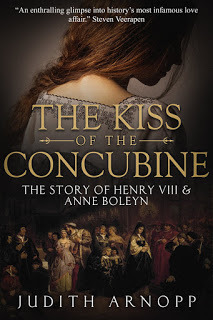
If you would like to READ MORE I am giving away one FREE signed paperback copy of The Kiss of the Concubine. Just comment on the blog below and share or tweet the link you followed to get here and your name will go into a draw. The winner will be announced on Sunday 24th May.
The Kiss of the Concubine is available on Kindle, Paperback and on Audible mybook.to/tkoc2
Published on May 18, 2020 01:30
May 11, 2020
Blog Tour - The Road to Liberation

As part of The Coffee Pot Book Club Blog Tour I am delighted to present:The Road to Liberation: Trials and Triumphs of WWIIA CollectionBy Marion Kummerow, Marina Osipova, Rachel Wesson, JJ Toner, Ellie Midwood, and Chrystyna Lucyk-Berger.
Riveting stories dedicated to celebrating the end of WWII.
From USA Today, international bestselling and award-winning authors comes a collection filled with courage, betrayal, hardships and, ultimately, victory over some of the most oppressive rulers the world has ever encountered.
By 1944, the Axis powers are fiercely holding on to their quickly shrinking territories.
The stakes are high—on both sides:
Liberators and oppressors face off in the final battles between good and evil. Only personal bravery and self-sacrifice will tip the scales when the world needs it most.
Read about a small child finding unexpected friends amidst the cruelty of the concentration camps, an Auschwitz survivor working to capture a senior member of the SS, the revolt of a domestic servant hunted by the enemy, a young Jewish girl in a desperate plan to escape the Gestapo, the chaos that confused underground resistance fighters in the Soviet Union, and the difficult lives of a British family made up of displaced children…
2020 marks 75 years since the world celebrated the end of WWII. These books will transport you across countries and continents during the final days, revealing the high price of freedom—and why it is still so necessary to “never forget”.
Stolen Childhood by Marion Kummerow
The Aftermath by Ellie Midwood
When's Mummy coming? by Rachel Wesson
Too Many Wolves in the Local Woods by Marina Osipova
Liberation Berlin by JJ Toner
Magda’s Mark by Chrystyna Lucyk-Berger
An Excerpt from JJ Toner, “Liberation Berlin”
Anton Tannhäuser was in a hurry. His troop leader, Ludwig, had sent him back to the hall to fetch the troop flag. Dressed in the black shorts and tan shirt of his Deutsches Jungvolk uniform, he charged down Spandauer Chaussee, weaving his way around and between the women and children on the footpath.
Without warning, an old man appeared from the crowd swinging a stiff leg right in Anton’s path. There was nothing he could do to avoid the collision, which seemed to happen in slow motion. His shins hit the old man’s leg and he shot forward, striking his knees and shoulder on the concrete slabs.
Even as he fell, Anton was aware that the old man’s leg was not made of flesh and bone. It was false, and hard as rock. His only thought as he fell was for the safety of the troop flag, which he released from his grasp.
Anton looked back in time to see the old man with the false leg spinning like a top onto the road into the path of a black police car. The car swerved and braked and screeched to a halt, inches from the man’s head. He had been carrying a bag of vegetables and these were now scattered and flying across the road.
Anton struggled to his feet, waving off the efforts of a couple of women trying to give him a helping hand. The pains in his knees and shoulder were excruciating, but he refused to cry. Both knees were red and bleeding.
The car doors flew open. Two policemen in green Schupo uniforms jumped out. One of them bent down to haul the man to his feet. The other man glowered down at him, shouting, “What are you doing? Do you want to get yourself killed? You could have caused an accident.”
The old man was clearly dazed. Weighed down by his false leg, his first attempt to get to his feet failed. The first policeman hauled him up, while the man braced his false leg against a tram rail to provide leverage. The second policeman made no move to help, standing back with one hand on the butt of the pistol on his hip.
Once the old man was upright again, he swung his leg onto the pavement. The policemen got back into their car, the doors slammed, and they continued on their way.
The women and children collected the scattered vegetables and put them into the old man’s bag.
Anton glared at him. “Dummkopf! Why don’t you watch where you’re going, old man?”
“I’m sorry, Herr Tannhäuser.” The man pointed to his leg. “I can’t move as fast as I used to.”
He knows my name!
“That leg is a danger to the public. You need to be more careful where you put it.” Anton snarled at him. “And how do you know my name?”
“You live in Kaiser Wilhelm 2,” said the old man. “I live in the same block.”
Anton took a moment to absorb that information. He had no recollection of a man with a wooden leg living in the block. Surely, he would have noticed. “Where in the block?”
“I live on the ground floor,” said the man. “I’m sorry about what happened. Will you be all right?”
Someone handed Anton his flagpole.
“People like you are a menace,” he said. “Don’t you know that every citizen of the Fatherland must make a positive contribution? What value are you to the Reich?”
Several of the women blanched at these words, as they should. He may have been only twelve years old, but, as a member of the Hitler Youth, he held power and influence well above his years.
The old man’s face flushed red. “I served my country for three years in the Low Countries, in France, and at the Eastern front.” He pointed to his leg. “I sacrificed more than most for my country.”
“Many sacrificed more,” Anton shouted back.
“What are you saying?”
“You survived. Many good Germans lost their lives.”
“Better not let the Gestapo hear you say that.” The old man turned his back and continued on his way, swinging his leg in that strange rhythm of his.
That riposte worried Anton. Had he said something the Gestapo would disapprove of? No one could deny that many Germans had been killed, but was it treasonous to say so in public? He wasn’t sure.
Anton shouted after him, “Yes, limp away, old man. And keep that leg out of public places where it can’t cause any more damage.”
***
While Frau Tannhäuser tended to Anton’s injured knee, he told her what had happened. “He stuck his wooden leg out in front of me, tripped me up. I could have been seriously injured…”
His mother made sympathetic clucking sounds.
“… I can’t understand why the Wehrmacht would consider it a good idea to prop up an old soldier like that, give him a false leg and send him home. What good is he to anyone with only one leg?”
Anton’s father sucked on his empty pipe. “That’s Hans Klein. He has an iron leg. He keeps a plot in the Schrebergärten, I believe. Grows vegetables.”
“Are there no able-bodied people to do that?” said Anton, snorting. “Some woman, perhaps?”
The two adults exchanged a despairing glance, but said nothing.
“I’m going to have to report the incident to Ludwig. Look at my uniform. He has ruined it. I will be required to explain that.”
“It’s nothing but a little dirt from the ground. Take off your shirt and I’ll wash it for you,” said his mother. “I wouldn’t say anything. You fell—”
“I didn’t fall, Mutter. I told you, the old man tripped me with his iron leg.” He took off his shirt and handed it to her.
“I’m sure he didn’t mean to,” she said.
“It was a deliberate act. I believe he may be an enemy of the Reich, a member of the subversive resistance.”
“I don’t think so,” said his father. “An old decommissioned soldier with only one leg working for the Resistance? How likely is that? You must have been running.”
“I was on an important errand.”
“Well there you are, then. You were rushing to complete your important work and you fell. No need to mention what you fell over.”
“It’s my duty to put in a full report. He could be a communist.”
His father shrugged, sucking hard on his dry pipe. “So you’ll say you fell over an old communist’s peg-leg? How do you think Ludwig and the troop will react to that?”
Anton shrugged.
“They will laugh at you.” His father shook spittle from his pipe into the fireplace.
His mother made more clucking sounds. “Do you have to do that?”
Anton thought about what his father had said for a few moments. “What about the damage to my knee? I will have to explain that.”
“You were running. You fell. You hurt your knee—”
“And my elbow.”
“And your elbow. No need to say anything about the old man or his leg.”
***
Later that night, Anton’s parents lay in bed in the dark.
“He used to be such a nice child,” she whispered. “Remember how he loved animals? How many sick birds did he rescue? And that squirrel…”
“He’s still the same boy.”
“You really think so? His whole world is filled with Führer worship, now. I wish he’d never joined the Jungvolk. They have turned his mind. I’m afraid we’ve lost him.”
Herr Tannhäuser was silent for a long time. Then he said, “He will come back to us after…”
“After the war, you mean? Do you really think so?”
“Yes. Once the Nazis have been defeated, he will see how wrong they were. We will get our son back. I’m certain of it.”
She lay silent for a while. Then she whispered, “He frightens me.”
“There’s nothing to be frightened about.”
“You hear terrible stories. Other parents have been betrayed by their sons.”
“He would never betray us. Not Anton.”
“You don’t know that. His mind is full of crazy Nazi ideas.”
“Yes, but what have we ever said against the Reich or the Führer?”
She turned onto her side, facing away from her husband. “Nothing. Nothing at all.”

Buy Links:
Amazon US: https://www.amazon.com/Road-Liberation-Trials-Triumphs-WWII-ebook/dp/B083SH7VJQ
Amazon UK: https://www.amazon.co.uk/Road-Liberation-Trials-Triumphs-WWII-ebook/dp/B083SH7VJQ
Amazon CA: https://www.amazon.ca/Road-Liberation-Trials-Triumphs-WWII-ebook/dp/B083SH7VJQ
Author Bio:
Marion Kummerow:
Marion Kummerow was born and raised in Germany, before she set out to "discover the world" and lived in various countries. In 1999 she returned to Germany and settled down in Munich where she's now living with her family.
After dipping her toes with non-fiction books, she finally tackled the project dear to her heart. UNRELENTING is the story about her grandparents, who belonged to the German resistance and fought against the Nazi regime. It's a book about resilience, love and the courage to stand up and do the right thing.
Marina Osipova:
Marina Osipova was born in East Germany into a military family and grew up in Russia where she graduated from the Moscow State Institute of History and Archives. She also has a diploma as a German language translator from the Moscow State Institute of Foreign Languages. In Russia, she worked first in a scientific-technical institute as a translator then in a Government Ministry in the office of international relations, later for some Austrian firms. For seventeen years, she lived in the United States where she worked in a law firm. Eventually, she found her home in Austria. She is an award-winning author and a member of the Historical Novel Society.
Rachel Wesson:
Rachel Wesson is Irish born and bred. Drawn to reading from an early age, she started writing for publication a few years back. When she is not writing, Rachel likes to spend her time reading and playing with her three kids. Living in Dublin there are plenty of things to do, although the cowboys and Indians of her books rarely make an appearance. To chat with Rachel connect with her on Facebook - authorrachelwesson. To check out her newest releases sign up to her mailing list.
JJ Toner:
My background is in Mathematics and computing, but I have been writing full time since 2005. I write short stories and novels. My novels include the bestselling WW2 spy story 'The Black Orchestra', and its three sequels, 'The Wings of the Eagle', 'A Postcard from Hamburg', and 'The Gingerbread Spy'.
Many of my short stories have been published in mainstream magazines. Check out 'EGGS and Other Stories' - a collection of satirical SF stories. I was born in a cabbage patch in Ireland, and I still live here with my first wife, although a significant part of our extended family lives in Australia.
Ellie Midwood:
Ellie Midwood is a USA Today bestselling and award-winning historical fiction author. She owes her interest in the history of the Second World War to her grandfather, Junior Sergeant in the 2nd Guards Tank Army of the First Belorussian Front, who began telling her about his experiences on the frontline when she was a young girl. Growing up, her interest in history only deepened and transformed from reading about the war to writing about it. After obtaining her BA in Linguistics, Ellie decided to make writing her full-time career and began working on her first full-length historical novel, "The Girl from Berlin." Ellie is continuously enriching her library with new research material and feeds her passion for WWII and Holocaust history by collecting rare memorabilia and documents.
In her free time, Ellie is a health-obsessed yoga enthusiast, neat freak, adventurer, Nazi Germany history expert, polyglot, philosopher, a proud Jew, and a doggie mama. Ellie lives in New York with her fiancé and their Chihuahua named Shark Bait.
Chrystyna Lucyk-Berger:
Chrystyna Lucyk-Berger was born in Minnesota in 1969 and grew up in the culture-rich neighborhood of "Nordeast" Minneapolis. She started her writing career with short stories, travel narratives, worked as a journalist and then as a managing editor for a magazine publisher before jumping the editor's desk and pursuing her dreams of writing and traveling. In 2000, she moved to western Austria and established her own communications training company. In 2005, she self-published a historical narrative based on her relatives' personal histories and experiences in Ukraine during WWII. She has won several awards for her short stories and now primarily writes historical fiction. During a trip into northern Italy over the Reschen Pass, she stood on the edge of Reschen Lake and desperately wanted to understand how a 15th-century church tower ends up sticking out of the water. What stories were lying beneath? Some eight years later, she launched the "Reschen Valley" series with five books and a novella releasing between 2018 and 2021.
For more on Chrystyna, dive in at inktreks(dot)com.

Published on May 11, 2020 00:31
April 30, 2020
Welcoming Mercedes Rochelle to the page!
I am excited to welcome Mercedes Rochelle to my blog with news of The King’s Retribution: Book 2 of The Plantagenet Legacy. I thoroughly enjoyed A King Under Seige and The King's Retribution is on my tbr list!
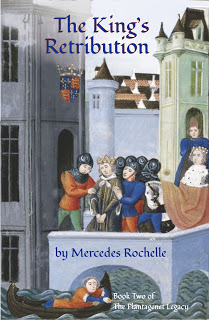
If you read A KING UNDER SIEGE, you might remember that we left off just as Richard declared his majority at age 22. He was able to rise above the humiliation inflicted on him during the Merciless Parliament, but the fear that it could happen again haunted him the rest of his life. Ten years was a long time to wait before taking revenge on your enemies, but King Richard II was a patient man. Hiding his antagonism toward the Lords Appellant, once he felt strong enough to wreak his revenge he was swift and merciless. Alas for Richard, he went too far, and in his eagerness to protect his crown Richard underestimated the very man who would take it from him: Henry Bolingbroke.
Here is an excerpt to whet your appetite:
Funeral of Robert de Vere
There was another matter weighing heavily on Richard's mind. Sparing no expense, the king had brought Robert de Vere's embalmed body back from Belgium. Exactly three years after his beloved friend had been killed in a boar hunt, Richard put him to rest in his family crypt at Colne Priory, in Essex. He staged an elaborate funeral, though many of the great lords were conspicuously absent. The Lords Appellant—with the exception of Mowbray—harbored rancor toward Robert de Vere that extended far beyond his death. Richard's uncles chose to ignore the king's eccentric loyalty toward a declared traitor. Even Thomas Arundel, his own chancellor, had sent his apologies. There was no mistaking the disrespect: the king noted the absence of every one of them.
On a late November evening, services began just at the cusp of twilight. Church bells tolled and swirling black clouds threatened rain. Two by two the funeral procession wended its way through the narrow streets of Earl's Colne, spaced perfectly in a seemingly endless column. Each man wore a black robe with a black hood drawn forward to cover his face. Every one of them carried a torch with a tiny shield bearing de Vere's arms below each flame. The torches cast a soft glow as the mourners walked past silent citizens lining the street. Finally the Archbishop of Canterbury and six other bishops brought up the end of the cavalcade, swinging incense burners that filled the air with sweet-smelling smoke. Their appearance signaled the presence of the king, also robed in black, though instead of a hood he wore a gold crown. He was followed by five knights: his nephew Thomas Holland, Earl of Kent, his cousin Edward Earl of Rutland, his half-brother John Holland, Earl of Huntingdon, Thomas de Mowbray Earl of Nottingham, and John de Montacute Earl of Salisbury. These five supporters of the king were worthy of note; they were destined to be among his closest advisors and friends, carefully marshaled to help support his throne. Never again would Richard be accused of elevating unworthy favorites; only earls and dukes would grace his inner chamber.
The silent participants filed into the church where the cypress coffin lay on its bier next to an open grave in the floor near the altar. A row of candles on tall iron stands threw a circle of light onto the deceased. An unseen choir, placed behind a curtain, filled the space with soft tones.
As the king entered the church the tolling ceased. He took his place in a stall topped by a crown and listened while Archbishop Courtney began the services, echoed by his bishops. The Matins for the Dead were followed by Nocturnes and Lauds. Then there was the Prayer for Absolution and the Celebration of the Mass. The candles had burnt to a nub and the air of the church was cold before Richard was finally able to approach the funeral bier.
With an expression of tenderness, Richard looked down on his dear friend. The king had paid for the best embalmer in Brittany, and Robert seemed to be sleeping before him, his face betraying no evidence of his violent death. The king gazed at Robert for a long time, toying with a sapphire ring on his own hand. Blinking rapidly, Richard drew off the ring and lifted Robert's wrist, pushing the band gently onto his friend's finger. He bent over the coffin and whispered something for Robert's ears alone.
"Mine eyes have longed to see your face," he said. "I will never forget you, nor will I rest until we are avenged on those who drove you from my side. Fear not, dear Robert. My resolve is firm and I would have you rest in peace."
Although everyone nearby strained to hear what Richard said, no one—even his closest friends—could decipher the words. But it didn't take a great leap of faith to guess the meaning of his gestures. Richard's enemies would later dismiss the legend that had grown from Robert de Vere's funeral services, but those who witnessed it were never able to shake a sense of foreboding.
All the king lacked was a pair of wings to complete the picture of an avenging angel.
You can find the books here: Amazon.com: https://www.amazon.com/Kings-Retribution-Book-Plantagenet-Legacy-ebook/dp/B085ZGL7SK
Amazon UK: https://www.amazon.co.uk/Kings-Retribution-Book-Plantagenet-Legacy-ebook/dp/B085ZGL7SK/
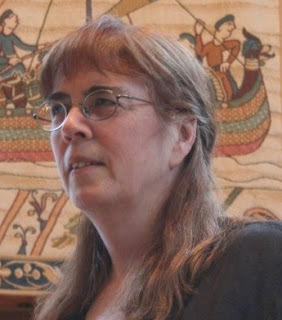 Mercedes Rochelle
Mercedes RochelleBorn in St. Louis MO with a degree from University of Missouri, Mercedes Rochelle learned about living history as a re-enactor and has been enamored with historical fiction ever since. A move to New York to do research and two careers ensued, but writing fiction remains her primary vocation. She lives in Sergeantsville, NJ with her husband in a log home they had built themselves.
If you'd like to connect with Mercedes here are her social media links: Website • Blog • Facebook • Twitter
Published on April 30, 2020 23:40
April 21, 2020
New Release from Mary Anne Yarde!
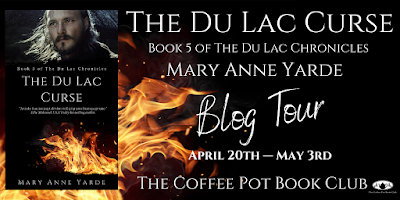
I am delighted to welcome awesome author Mary Anne Yarde to my blog to tell us about her latest release: Book 5 of The Du Lac Chronicles

The Island of Tin and King ArthurBy Mary Anne Yarde
From the breathtaking beauty of the coast.
 The view from Tintagel Castle
The view from Tintagel CastleTo the enduring Standing Stones whom for thousands of years have sat in watchful silence on Bodmin Moor.
 The Hurlers
The HurlersCornwall. A kingdom within a nation. A place where one step can take you on a journey the likes of which you could never imagine. This is a land of wild seas, myths and legends.
In the 6th Century, Cornwall was very much her own nation, just like she had always been. She was separated from the rest of mainland Britain by not only her language and her customs, but also by a spirit that refused to bow down to imposed authority — whether that be Roman or Saxon.
My series, The Du Lac Chronicles, is set in war-torn South-West Britain, Wales, Brittany, Frank as well as Jerusalem. But for today, I am going to talk about Cornwall, or the Kingdom of Cerniw, as she is known in my series.
Cornwall is my secret love affair. If I could choose to live anywhere in the world, it would probably be there. Not only does she have the most staggeringly beautiful countryside and sea, but her history is also something to admire and her legends…well, they are just my cup of tea.
 Penhale Sands
Penhale SandsCornwall has an intriguing past. Now we all know that Emperor Hadrian built a massive wall to divide the North of the country from the South because the North was too wild to be conquered. But nothing is ever mentioned about the little kingdom in the far South-West of Britain. The Roman occupation of Cornwall is very intriguing. It has been suggested that the Roman's stopped at Devon — there are a few milestones and evidence of Roman occupation in Cornwall, but not on the scale of the rest of the county. Why? What was it about this little kingdom that stopped even the Roman Empire in its tracks?
Cornwall had something that the Roman's wanted, and I think they kept their independence because they knew what they were doing when it came to commerce. Cornwall had something, in fact, that everyone wanted. Tin. The history of mining for tin in Cornwall goes way back, far before the time of Winston Graham's Poldark series. Cornwall was known as The Island of Tin. Silver has also been found in Cornwall. The land is rich with treasure for those who know where to look. And trade means money and money…I heard that makes the world go round.
Fast-forward to the time when my books are set in, and once again Cornwall is standing firm against a foreign aggressor. Rome did not best her and nor would the Saxons.
I am fascinated by the Saxon invasion, and it is something that I explore in my series. In particular, I am interested in the Saxon king, Cerdic of Wessex, and his journey to being crowned High King. While other kingdoms fell by the wayside and became incorporated into the Wessex realm, Cornwall held her ground. Cerdic landed in Hampshire in c.495. By 519, Cerdic had conquered the South of England, with the exception of Cornwall. It wasn't until the Battle of Hingston Down, in 838, when Cornwall finally lost her independence to the now vast Kingdom of Wessex. Cornwall repelled the Saxons for almost 350 years. Now, that is impressive.
 Dozemary Pool
Dozemary PoolAs the water settles over Dozemary Pool and when the sun sets over the grass-covered ruins of Castle Dore, it is easy to believe in the stories this land inspires. If King Arthur was not born at Tintagel Castle, then he should have been. If Arthur did not fall at Slaughter Bridge, then, where did he? This is the land of King Arthur. This is the land where his reign began, and this is the land where it ended. If, you believe the stories that is.
Arthurian Legend and Cornwall have a relationship that spans over a thousand years. The Du Lac Chronicles explores what happened after the death of King Arthur, and therefore Cornwall is a fundamental backdrop to my series.
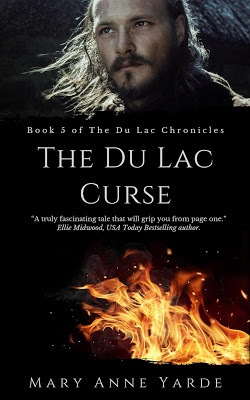
The Du Lac Curse: Book 5 of The Du Lac ChroniclesbyMary Anne Yarde
God against Gods. King against King. Brother against Brother.Mordred Pendragon had once said that the sons of Lancelot would eventuallydetroy each other, it seemed he was right all along.Garren du Lac knew what the burning pyres meant in his brother's kingdone - invasion. But who would dare to challenge King Alden of Cerniw for his throne?Only one man was daring enough, arrogant enought, to attempt such a feat - Budic du Lac, their eldest half-brother.While Merton du Lac struggles to come to terms with the magnitude of Budic's crime, there is another threat, one that is as ancient as it is powerful. But with the death toll rising and his men deserting who will take up the banner and fight in his name?
Available for Pre-Order NOW!
Amazon UKAmazon US
Twitter Handle: @maryanneyarde
Hashtags: #HistoricalFiction #Arthurian
Published on April 21, 2020 00:30
March 28, 2020
Author Drēma Drudge stops by on her blog tour!
I am pleased to host Drēma Drudge as part of her Book Tour.
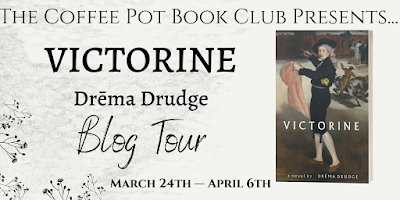
VictorineBy Drēma Drudge
In 1863, Civil War is raging in the United States. Victorine Meurent is posing nude, in Paris, for paintings that will be heralded as the beginning of modern art: Manet's Olympia and Picnic on the Grass. However, Victorine's persistent desire is not to be a model but to be a painter herself. In order to live authentically, she finds the strength to flout the expectations of her parents, bourgeois society, and the dominant male artists (whom she knows personally) while never losing her capacity for affection, kindness, and loyalty. Possessing both the incisive mind of a critic and the intuitive and unconventional impulses of an artist, Victorine and her survival instincts are tested in 1870, when the Prussian army lays siege to Paris and rat becomes a culinary delicacy. Drema Drudge's powerful first novel Victorine not only gives this determined and gifted artist back to us but also recreates an era of important transition into the modern world. (Victorine is currently up for pre-order on Amazon US only)
Amazon US

Here is a tempting excerpt from the book.
Victorine’s Song
After our morning session (Manet thoughtfully brings me a brioche and un café in an enameled mug), he leaves me to sort out my affairs, but not before foisting some francs in a monogrammed handkerchief upon me. “An advance,” he says. I take the coins gratefully, offer him back his handkerchief, wishing he had advice to dispense as easily: I have no idea what to do now. The “friends” I had while with Alphonse quickly fell away as Willie and I wrapped our lives as one, two bodies in a bath towel. To return to my former friends would be to return to their hopeless way of life. I will not. To go back to Madeline is quite as impossible. The room lights up with the sun as if the answer leaks in with it, but it doesn’t, not even as I acknowledge that the rosy bits of sky look like Willie’s cheeks. I reject the sky’s proposal: One does not welcome a tornado into one’s room. True, I have survived Willie, but just. My hungers do not scare me, but even I can recognize an unwinnable bout. I pace the studio, but the room is too quiet, and the sun insists I listen to things I will not. I pick up my worn canvas bag, the one I used to carry my schoolbooks in, now filled with my portable life. Hesitating briefly, I pull the door shut, lock it behind me. Paris will tell me what to do next, I think, as I promptly stumble over a loose brick. At the time, it doesn’t occur to me to be grateful. “Haussmann,” I mutter as I grab my ankle. I’ve watched the architect ruin our city, block after block, a hungry monster with the sightline of a sugar-crazed toddler, squashing decades, centuries, of our history, obliterating my people, the poor, as if they were a nest of rats. Poorer Parisians have run from him from quarter to quarter, but no sooner are we safe in one house than Haussmann finds it, has his people give us notice one day, and tears it down the next. We can only watch, hope to rescue a brick from the house where our grandfather was born. I despise him. There is, however, something euphoric about the planned natural disaster; I love the confused buildings that seemed so stable and secure now shaken. Watching them collapse thrills me. The rubble is a symphony of colors and textures. We see the inside turned out. We see things we are not meant to see. I notice that most people avert their gaze when they pass a worksite. Not me. His new lines are straight and wide, and though I hate the uniformity of his design and his disregard for history, I do admire his ambition. The wide boulevards are to aid, it is rumored, in the moving through of troops in case of another uprising. True, but there is such space now that has so often been denied us. I hate the daily cost as I watch the poor get poorer, as they pile into a house twenty thick, disease following them. At least outdoors we have all of the space God created; they cannot take that from us, and Haussmann creates even more as he purges the city of centuries’ worth of buildings.While some have praised his sanitary building of public urinals in the streets, others have been scandalized that men would touch themselves in this manner publicly. Once when I had to go very badly, I lifted my skirts and managed to utilize one as well. Though there were men on either side of me, the cries of protest I heard behind me weren’t aimed at them, even though my wide skirts more than covered me. My stumble provides me with an answer: A nearby sign in a window announces a room for rent. I bend over and kiss the brick before limping over to the soiled tavern. I have to pay extra rent because the proprietress assumes I am a prostitute. I don’t bother to correct her because I don’t care what she thinks of me, and the “extra” isn’t enough to matter. For the first time I am to live alone, and though it is cold (I have bought no coal yet and it is not equipped for gas) and though it is dirty (I will clean it), it is a space that belongs entirely to me. I strum the lovely, dove gray rails of my bed in my newly rented room. A few good wallops smooth the worst of the lumps in the horsehair mattress. I must carry my water up at night and my slops down in the morning, but I don’t care. It will give me an excuse to buy flowers from the little stand nearby. Flowers trump even night soil, and they certainly help mask the odor. The first night I create shadow puppets on the walls to ease my loneliness and the slight ache in my ankle, in my heart. I wake to see a melted candle stub—I kept it burning not out of fright but because I adore the way the flame lights the walls. My clothes hang from stray nails. That is all there is to my room besides the two windows and the cold tiled floor. I need nothing else besides enough dishes for one, possibly two if I invite anyone else over. I don’t know that I will. This brand of loneliness instructs, and I mean to surrender to it until I’ve learned all that I can. I grab a chair and yank the paint skin from the ceiling in pieces, showering myself with plaster but revealing splotches of pink overhead. I laugh as I walk past the cracked mirror and see my whitened face. I stop and really look, see things now the other artists haven’t, like the humor at the corners of my eyes, the content set of my lips. I’d rather model forever than paint flowers on a cup that someone is going to drink from without seeing. Tiny sips of beauty ruin the deeper thirst for art. Pretty cups and cheerful hats are made to mollify women. Why can’t I paint myself? Create myself? I count the francs left. I may not be able to go to art school, but I can buy some art supplies. I pocket the money. There is next week’s rent to consider. Mine, not my parents’ rent, because they have decided that my money is not worthy of saving them. I must find a way to get them to accept. They cannot afford their pride, but I don’t think they know that yet and they may not before it’s too late. And without a teacher, someone respected by The Academy, no one would take me seriously as an artist anyway. “So what?” begins gently stirring in me, and I crave absinthe. Instead, I carry up some water for a wash. It may have taken God a week to create the earth, but I have gone from homeless to having my own place in one day, which seems an impossible task. Being a woman and so young, I’d say I’m giving Him a run for His money; I think I can do without a drink for one day. Without meaning to, I cross myself.
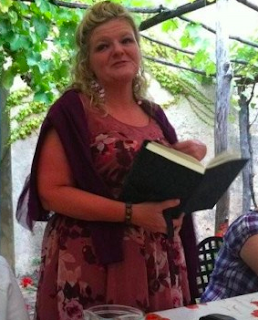 Drēma Drudge
Drēma DrudgeDrēma Drudge suffers from Stendhal’s Syndrome, the condition in which one becomes overwhelmed in the presence of great art. She attended Spalding University’s MFA in Creative Writing Program where she learned to transform that intensity into fiction.
Drēma has been writing in one capacity or another since she was nine, starting with terrible poems and graduating to melodramatic stories in junior high that her classmates passed around literature class.
She and her husband, musician and writer Barry Drudge, live in Indiana where they record their biweekly podcast, Writing All the Things, when not traveling. Her first novel, Victorine, was literally written in five countries while she and her husband wandered the globe. The pair has two grown children.
In addition to writing fiction, Drema has served as a writing coach, freelance writer, and educator. She’s represented by literary agent Lisa Gallagher of Defiore and Company.
Connect with Drema: Website • Twitter • Instagram • The Painted Word Salon.
Website: https://dremadrudge.com/Twitter: https://twitter.com/dremadrudge Instagram: https://www.instagram.com/dremadrudge/The Painted Word Salon (Facebook): https://www.facebook.com/groups/485639358698462/members/
Published on March 28, 2020 01:06
March 17, 2020
The Wars of the roses and the Tudors in Wales
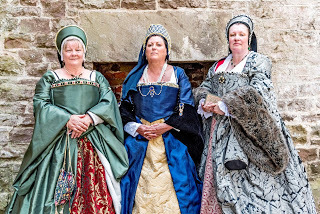 The Fyne Companye of CambriaEvery so often during the summer I get together with a few friends and dress up in Tudor finery and swish around castles. I've lived in Wales for more than twenty years and love the castles and places of historic interest. I was surprised to discover just how large a part Wales played in the wars of the roses and the transition from Plantagenet to Tudor rule.
The Fyne Companye of CambriaEvery so often during the summer I get together with a few friends and dress up in Tudor finery and swish around castles. I've lived in Wales for more than twenty years and love the castles and places of historic interest. I was surprised to discover just how large a part Wales played in the wars of the roses and the transition from Plantagenet to Tudor rule.
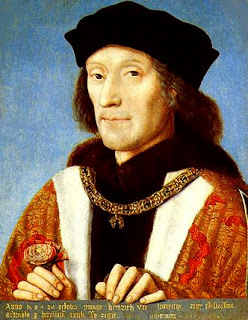 Henry Tudor - Wikimedia commonsWhen Henry Tudor won the crown of England and married Elizabeth, the eldest daughter of Edward IV, he united the houses of York and Lancaster, thus ending years of strife in the realm. The castles, palaces and manor houses of Wales sheltered some of the key players during this time.
Henry Tudor - Wikimedia commonsWhen Henry Tudor won the crown of England and married Elizabeth, the eldest daughter of Edward IV, he united the houses of York and Lancaster, thus ending years of strife in the realm. The castles, palaces and manor houses of Wales sheltered some of the key players during this time. 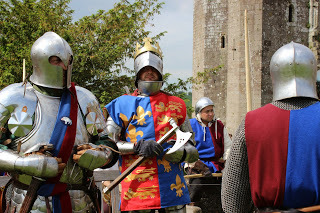 Before the battle - reenactors at Raglan CastleHenry Tudor’s mother, Margaret Beaufort, was married to Edmund Tudor at around the age of twelve. As a young bride she lived with Edmund during his campaign in Wales on behalf of Henry VI. The lived together at
Caldicot Castle
,
Lamphey Bishop’s Palace
until Edmund died at
Carmarthen Castle
of a combination of wounds sustained in battle and the plague.
Before the battle - reenactors at Raglan CastleHenry Tudor’s mother, Margaret Beaufort, was married to Edmund Tudor at around the age of twelve. As a young bride she lived with Edmund during his campaign in Wales on behalf of Henry VI. The lived together at
Caldicot Castle
,
Lamphey Bishop’s Palace
until Edmund died at
Carmarthen Castle
of a combination of wounds sustained in battle and the plague. 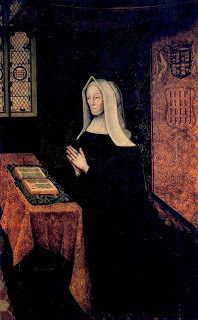 Margaret Beaufort - wikimediacommonsFinding herself widowed, Margaret turned to the protection of her brother in law, Jasper Tudor, Earl of Pembroke, who took her to his stronghold at
Pembroke Castle
where she gave birth to Henry.
Margaret Beaufort - wikimediacommonsFinding herself widowed, Margaret turned to the protection of her brother in law, Jasper Tudor, Earl of Pembroke, who took her to his stronghold at
Pembroke Castle
where she gave birth to Henry. Pembroke CastleJust outside Abergavenney in Monmouthshire lies
Raglan Castle
where the young Henry Tudor spent much of his childhood under the care of William Herbert before escaping overseas with his uncle, Jasper Tudor.
Pembroke CastleJust outside Abergavenney in Monmouthshire lies
Raglan Castle
where the young Henry Tudor spent much of his childhood under the care of William Herbert before escaping overseas with his uncle, Jasper Tudor. You can read a history of Raglan here : https://juditharnoppnovelist.blogspot.com/2014/05/raglan-castle-tudor-weekend-30th-may-1.html
 Raglan castleA short distance from Raglan is
Tretower Court and Castle
– a fabulous reconstructed Tudor manor house that belonged to William Herbert’s half-brother, Roger Vaughan. He fought at Mortimer’s Cross and Tewkesbury and was beheaded at Chepstow by Jasper Tudor in an act of vengeance for beheading his father, Owen Tudor, ten years previously. https://englishhistoryauthors.blogspot.com/2012/08/tretower-court-and-castle-judith-arnopp.html
Raglan castleA short distance from Raglan is
Tretower Court and Castle
– a fabulous reconstructed Tudor manor house that belonged to William Herbert’s half-brother, Roger Vaughan. He fought at Mortimer’s Cross and Tewkesbury and was beheaded at Chepstow by Jasper Tudor in an act of vengeance for beheading his father, Owen Tudor, ten years previously. https://englishhistoryauthors.blogspot.com/2012/08/tretower-court-and-castle-judith-arnopp.html Tretower Court
Tretower CourtToward the end of the wars of the Roses, Carew Castle belonged to Rhys ap Thomas who turning his back on Richard III supported Henry Tudor at the battle of Bosworth. He was richly rewarded with a knighthood and land which enabled him to make vast improvements to the castle in the late 15thcentury. His son Rhys ap Gruffudd was later executed for treason by Henry VIII in 1531.
 Carew Castle - Wikimedia commons
Carew Castle - Wikimedia commonsAll the above mentioned castles are within easy reach of where The Fyne Companye of Cambria and we hope to expand our horizons in the future.
.
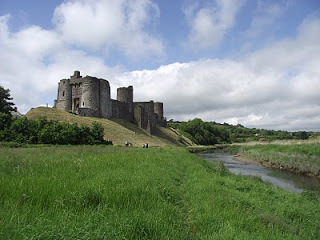 Cydwelli Castle
Cydwelli Castle
Published on March 17, 2020 09:05
December 20, 2019
A Tudor Christmas
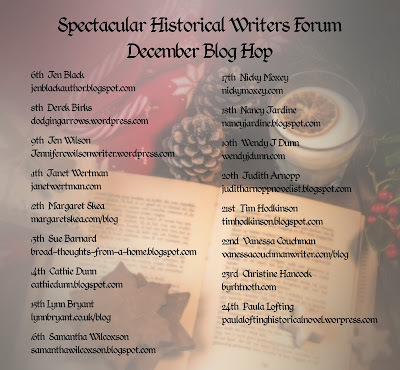
If we were to travel back in time to any Christmas during the Tudor period, we’d recognise a few of the traditions but there were others that would certainly surprise us. Religion of course played a huge part in all aspects of Tudor life and at Christmas time fasting and mass took precedence over gift-giving and carousing.
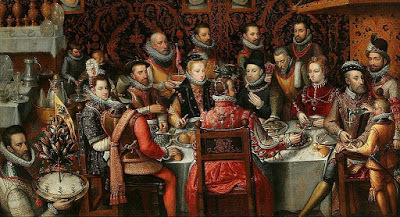 Alonso Sánchez Coello [Public domain]Christmas was a time of prayer and feast; the spinning wheel which occupied a corner of most homes, sat idle until the first Monday after epiphany (Plough Monday) when work would be resumed. While we adorn a tree, they decorated the spinning wheel with evergreen boughs, holly and ivy, a remnant of a ritual from pagan times.
Alonso Sánchez Coello [Public domain]Christmas was a time of prayer and feast; the spinning wheel which occupied a corner of most homes, sat idle until the first Monday after epiphany (Plough Monday) when work would be resumed. While we adorn a tree, they decorated the spinning wheel with evergreen boughs, holly and ivy, a remnant of a ritual from pagan times. medieval singers mary evans picture library
medieval singers mary evans picture libraryAnother tradition that preceded Christianity was the Wassail in which a wooden bowl containing hot ale, spiced apple, sugar and other spices, was carried from door-to-door. Neighbours were invited to drink in exchange for a coin. For the more formal Wassail held at court, a bowl was passed around by royal stewards, the king being served last.
So now is come our joyful'st feast,Let every man be jolly.Each room with ivy leaves is drest,And every post with holly.Though some churls at our mirth repine,Round your foreheads garlands twine,Drown sorrow in a cup of wine,And let us all be merry.George Wither (1588-1667)
The yule log, a huge trunk or bundle of faggots (depending on the size of one’s hearth) was brought in from the forest. It was burned for the entire twelve days of the Christmas celebration, and it was considered lucky to keep charred remnants to start off next year’s yule fire. Aspects of this tradition are still in use today, although our log tends to consist of cake and chocolate and icing sugar.
As part of the festivities in royal houses, a boy or a fool would be ‘crowned’ the Lord of Misrule. Under his command normal order was overturned and the fool became king, and vice versa. For the entertainment of the court, the Lord of Misrule could command anybody to do anything. It was a time of total chaos and one that escapes my usually fertile imagination, for I cannot imagine Henry VIII allowing anyone to make a public mockery of him, let alone a fool … but apparently, he did.
In Survey of London, published in the first year of James I rule, John Stow says:In the feaste of Christmas, there was in the kinges house, wheresoeuer hee was lodged, a Lord of Misrule, or Maister of merry disports, and the like had yee in the house of euery noble man, of honor, or good worshippe, were he spirituall or temporall. Amongst the which the Mayor of London, and eyther of the shiriffes had their seuerall Lordes of Misrule, euer contending without quarrell or offence, who should make the rarest pastimes to delight the Beholders.
In 1525 Henry VIII appointed not only a Lord of Misrule for his own household but also one for Princess Mary’s – the ensuing chaos must have been considerable and we know from records that things often got out of hand. There was even an ecclesiastic version of misrule when boy bishops were elected, often known as ‘Fool Bishop’ or ‘Fool Abbot’. John Southworth says in his book Fools and Jesters at the English Court:
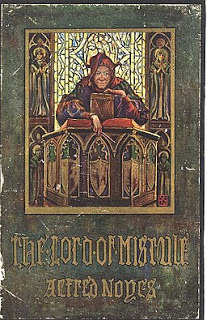
‘What followed over the next few days is commonly described as burlesque, a turning upside down of the normal liturgy; it is more accurately seen and understood as the literal acting out of the Magnificat, in which the ‘nobodies’ among the clergy, as represented by the fool and his assistants, were exulted as a salutary foretaste and prophetic anticipation of the Last Judgement.’ (Southworth: p.70)By Elizabeth’s reign, presumably having run out of ideas for inventive mischief, the practice had almost died out.
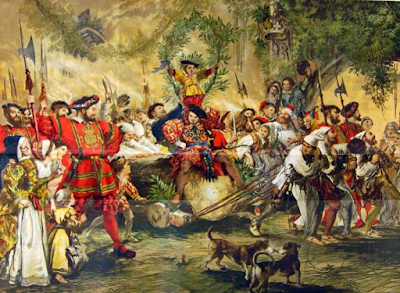 Feast of Fools
Feast of FoolsAll this unbridled excitement clearly gave the Tudors an appetite, for the Christmas menu seems more outrageous (to us) than their behaviour.
Poorer folk feasted on umble pie – pastry filled with the chopped and minced heart, liver, lungs and kidneys of a deer, but the affluent gorged on richer fare. Along with the traditional Christmas dishes of swan, peacock and dolphin (yes, I know) Henry VIII was the first monarch to introduce turkey to the royal table, but there were other … stranger things.
Christmas pie – sounds yummy – was rather like a Russian doll but with poultry, and consisted of a turkey stuffed with a goose, stuffed with a chicken, stuffed with a partridge, stuffed with a pigeon. This pie was served in a pastry case, surrounded by joints of hare, small game and wild fowl. May not be as yummy as it sounds then – I think I will be sticking with my nut roast this year.
And if that sounds weird, Cockenthrice was weirder still. Most of us have seen the grotesques in the margins of medieval manuscripts, strange half-beasts comprised of different animals – a rabbit with a man’s head or a lion with a dragon’s head, or a snail with the head of a cat. Well, it didn’t stop at the drawing stage. The Tudor table benefitted from dishes that were constructed in a similar inventive manner. Cockenthrice was comprised of a sucking pig, sewn to the back end of a goose (or something similar) – there are some gruesome pictures on-line - google it, I dare you!
Mince (or minst) pies might sound familiar but these were not made by Mr Kipling (other pies are available) and consisted largely of prunes, raisins, dates, powdered beef, butter, egg yolk, flour, suet or marrow, and minced mutton and seasoned with salt, pepper and saffron – these thirteen ingredients represented Christ and the apostles, all baked in a pie crust shaped like a manger to symbolise the holy birth.
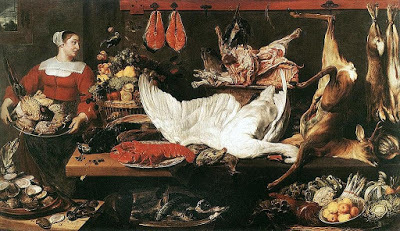 Frans_SNYDERS,_The_Pantry
Frans_SNYDERS,_The_PantryLike the Christmases of today, everyone celebrated differently. Our Christmas has merged with winter celebrations of other religions, and new ideas and traditions have evolved but the Tudor Christmas is still detectable. While the Tudors brought in greenery to decorate their homes, modern homes are largely in tinsel and plastic and lights that can be seen from space. Tudors fasted until Christmas day, Christmas Eve being especially strict with no meat, cheese or eggs. This meant that come Christmas Day everyone was ready to gorge themselves and records show that royal households consumed as many as twenty four courses! Although we don’t tend to go that far today, lots of us diet desperately to fit into a little black dress and then blow it all by over eating on the big day!
Now, as it was then, Christmas remains a time to be spent with family and friends, and however you spend yours, traditional or otherwise, celebrating with loved ones or working, make sure it is a good one, and after you’ve toasted the queen, don’t forget to raise a glass to the Tudors.

All of Judith Arnopp's books are available in Paperback, Kindle and some are on Audible. For more information click here: author.to/juditharnoppbooks
The Heretic Wind: the story of Mary Tudor, Queen of England is available for Pre-order NOW! mybook.to/thw

Tomorrow is Tim Hodkinson's turn - click here to go to his blog. http://timhodkinson.blogspot.com/
Published on December 20, 2019 02:11
November 17, 2019
The death of Mary Tudor
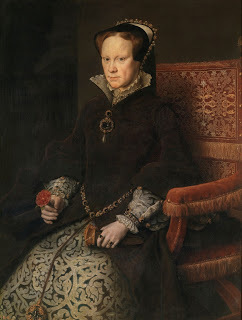 Mary Tudor - Wikimediacommons
Mary Tudor - WikimediacommonsIn November 1558 Mary Tudor died at St James’ Palace at the age of 42. By the standards of today, that is a horribly young age to die but Mary had suffered a hard life and was prematurely aged, and very sick.
Everyone is guilty of something. In most cases we are remembered for our good deeds, our happiest days, and our kindest actions but Mary, as with her father, Henry VIII, is only remembered for cruelty.
Personally, I think it would be awful if at my funeral people only spoke of my sins and overlooked my goodness (and there have been one or two occasions when I’ve been kind). The burning of heretics sounds dreadful to us because we live in a (ahem) tolerant society but in the 16th century burning was the standard punishment for heresy. Mary didn’t dream up the idea for the satisfaction of her monstrous soul.
While I am in no way seeking to excuse or white-wash her actions, I think she deserves a fuller picture. When you take into account the tragic childhood, her adult disappointments, her frustration then it is easier to understand her. There was much more to her than cruelty.
There are many recorded instances in which she was kind and generous, and I think she was terribly well-meaning. She adored her subjects and envisioned leading her people to salvation but things didn’t turn out as she intended. Her reign was far from benign.
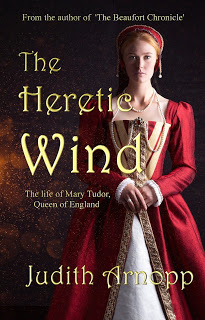 Coming soon
Coming soonWhile researching for The Heretic Wind I discovered Mary Tudor to be a sad, isolated and desperate woman whose intention was to be a good and loving Queen. The fact things turned out rather differently were mostly due to exterior forces. Her conviction that the Catholic faith was the only faith is difficult for us to understand but we don’t have to look very far to find other religious zealots. It doesn’t begin or end with Mary.
In The Heretic Wind, the mortally sick and embittered Mary looks back on her life and explains to some extent, the reasons why events unfolded as they did.
Rest in Peace, Mary.
Short blurb of The Heretic Wind – Coming soon!
Adored by her parents and pampered by the court, the infant Princess Mary’s life changes suddenly and drastically when her father’s eye is taken by the enigmatic Anne Boleyn.
Mary stands firm against her father’s determination to destroy both her mother’s reputation, and the Catholic church. It is a battle that will last throughout both her father’s and her brother’s reign, until, she is almost broken by persecution. When King Edward falls ill and dies Mary expects to be crowned queen.
But she has reckoned without John Dudley, the Duke of Northumberland, who before Mary can act, usurps her crown and places it on the head of her Protestant cousin, Lady Jane Grey.
Furious and determined not to be beaten, Mary musters a vast army at Framlingham Castle; a force so strong that Jane Grey’s supporters crumble before a blow is struck, and Mary is at last crowned Queen of England.
But her troubles are only just beginning. Rebellion and heresy take their toll both on Mary’s health, and on the English people. Suspecting she is fatally ill, and desperate to save her people from heresy, Mary steps up her campaign to compel her subjects to turn back to the Catholic faith.
All who resist will face punishment for heresy in the flames of the Smithfield fires.
The Heretic Wind will be available on Kindle and in Paperback.

Judith Arnopp is the author of twelve Historical Fiction novels:
The Heretic Wind; the life of Mary Tudor, Queen of EnglandSisters of Arden The Beaufort Chronicles: the life of Lady Margaret Beaufort (three book series)A Song of Sixpence: the story of Elizabeth of YorkIntractable Heart: the story of Katheryn ParrThe Kiss of the Concubine: a story of Anne BoleynThe Winchester Goose: at the court of Henry VIIIThe Song of HeleddThe Forest DwellersPeaceweaver
To discover more visit Judith’s website or author pagewww.judithmarnopp.comauthor.to/juditharnoppbooks
Published on November 17, 2019 01:48
November 3, 2019
Great news! The Second Book in Lynn Bryant's Manxman Series is OUT NOW!

31st October 2019 sees the publication of the second book in Lynn Bryant’s Manxman series. The first book, An Unwilling Alliance was recently shortlisted for the Society for Army Historical Research 2019 fiction prize. Its sequel, This Blighted Expedition, tells the story of the Walcheren campaign of 1809.
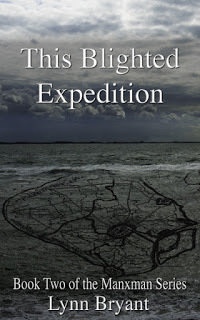
Hugh waited, feeling oddly nervous. He had last seen his son as a small baby of four months. After their marriage in Denmark almost two years earlier, Roseen remained with him, even when his ship, the Iris, was sent to Gibraltar as part of a squadron to defend the island, which was a major supply base for the war against Bonaparte in Spain.
Roseen adapted to shipboard life with typical Manx practicality and Hugh loved having her with him although the times he had to leave her on shore worried him. Gibraltar was known to be an unhealthy place with regular outbreaks of disease and after Roseen’s brush with death on a fever-ridden ship going to Denmark, Hugh was permanently on edge about her health. Hugh was overjoyed when Roseen announced that she was with child and she had sailed through both pregnancy and childbirth without difficulty but Hugh knew that his wife and son could not remain with the Iris or on the fever-ridden shores of Gibraltar.
Parting from her tore a piece from Hugh’s heart, and he had lived the last eight months waiting for her letters and dreaming of her at night. He was shocked at how much his happiness had come to depend upon her, but the knowledge that she was safe and well back on Mann was a comfort through the long months.
Orders had brought Hugh back to England, ready to join a new expedition. There was no official destination yet, although navy gossip suggested it was likely to be somewhere in the low countries. Hugh, who had his own sources of information, summoned his first officer and asked for news.“It’s not official yet, sir,” Lieutenant Durrell said.“Clearly not, or I’d be telling you, not asking you. Sit down, pour the wine, and remove the stuffed owl expression from your face, I’m not going to write to the London Gazette with the information. Where are we going?”Alfred Durrell folded his lanky frame into the chair in Hugh’s dining cabin and poured for both of them. “The island of Walcheren,” he said. “My brother writes that the government wishes to support Austria in its new campaign against Bonaparte, with more than just money.”
The Walcheren campaign was the largest British operation of the war, with 40,000 men and around 600 ships heading to the Scheldt for a lightning strike against Bonaparte’s dockyards at Vlissingen and Antwerp, yet most people have never heard of it. Possibly this is because it turned out to be one of Britain’s greatest military disasters. Vlissingen was almost destroyed by a bombardment, but the progress of the operation was so slow that the French had time to pour in reinforcements while the navy spent a good deal of its time pegged down by contrary winds. By the time Lord Chatham’s army was ready to march on Antwerp, the French had improved their defences and the British army were beginning to show signs of the dreaded Walcheren fever which killed over four thousand men and left many more on the sick list for years to come.
This Blighted Expedition follows the story of six people through the horror of the Walcheren campaign and its aftermath. Captain Hugh Kelly of the Iris, the Manx hero of An Unwilling Alliance is enjoying a brief reunion with his wife and baby son when he receives new orders to join the expedition on the south coast, along with his first lieutenant, Alfred Durrell. In the meantime, the second battalion of the 110th infantry is waiting to embark for Walcheren. Among them are a young lieutenant of the seventh company, Giles Fenwick, who is a permanently broke younger son of the aristocracy and Captain Ross Mackenzie, who is recovering from the tragic deaths of his wife and daughter and has recently transferred in to command the light company. Meanwhile, in Walcheren, Katja de Groot, a young Dutch widow is raising three children while managing her husband’s textile business, and worrying about the impact of a British invasion on her workshops, her family and her home.
The interaction of these six people with each other and with a host of secondary characters, both fictional and real is at the heart of the novel. In particular, Lieutenant Durrell finds himself torn between old family loyalties to the Earl of Chatham, who commands the army, and the clever, manipulative Sir Home Popham who serves the interests of the navy – and himself.I love every one of my six protagonists. Hugh and Roseen are old friends, and it has been fun to revisit them two years into married life and in particular, to see how much Roseen has grown up from the shy, awkward tomboy that Hugh fell in love with. It is also interesting to see how much Hugh still has to learn about his wife.

Ross Mackenzie and Katja de Groot are both new characters, and have a lot in common. Both are widowed and have experienced the loss of a child to illness and both have become used to managing alone, not sharing their feelings. They are on opposite sides of a war, and the book explores what that means to them and whether friendship can develop in spite of it.Giles Fenwick is the hero of The Reluctant Debutante, and features in the Peninsular War Saga and in one of my short stories, An Exploring Officer. I’m going back in time with Giles here, exploring his early history with the regiment, before he arrives in Portugal and it’s fascinating to be able to weave in his story to show how Giles became the man he is in later books.
But of all my characters, this book belongs to Alfred Durrell. Durrell was a secondary character in the previous book, a gangly, awkward young man who provided a comic foil to Hugh’s Manx directness. Durrell had the education and the political connections while Hugh was the man of action who “had the reputation of a man who could snatch a prize out of thin air and could keep any leaky old bucket afloat.”
Durrell isn’t a typical hero, but Walcheren isn’t a typical campaign. He’s very intelligent, well educated and very confident in his own abilities, but has no idea how to gossip, flirt or stop talking once he’s started. While Hugh Kelly managed to kiss Roseen on their second ‘date’ poor Durrell is more likely to give a girl a lecture on the physiology of crying. What Durrell has is integrity, and honesty and a good deal of kindness. He is incapable of being a bystander, he’s always the man who steps up and takes responsibility. Your brother and sister would take the mickey out of you if you brought Durrell home for dinner, but your Mum would be very pleased.
This Blighted Expedition is available on Amazon kindle here and will be out in paperback by the end of November.
To celebrate publication, the first book, An Unwilling Alliance is available from 1st to 5th November 2019 FREE on Amazon here.
In the meantime, I am about to embark on book six of the Peninsular War Saga. It’s called An Unrelenting Enmity and to give myself a kick start with the writing process, I am attempting NaNaWriMo for the first time ever.
To follow my progress why not join me on my blog over at Writing with Labradors, or on Facebook or Twitter?
Published on November 03, 2019 09:00
October 23, 2019
Welcoming author Sally Spedding to the blog
 I am very pleased to have Sally Spedding on the blog today. She is the author of multiple spooky crime noir novels. Tell us about your work Sally.
I am very pleased to have Sally Spedding on the blog today. She is the author of multiple spooky crime noir novels. Tell us about your work Sally.In 1997, having moved from rural Wales to Northampton, because of my late husband’s new job, I used a ruler to find the nearest coast, where Norfolk is divided from Lincolnshire by the River Nene. These atmospheric flatlands became the setting for ‘Wringland’ where a new housing development is haunted by a woman hanged in public in that very place.
Published in 2001 in a two-book deal with Pan Macmillan, this was the start of a journey where settings are paramount. Where characters don’t change, they just reveal themselves, and now with ‘The Devil’s Garden,’ set near Tulle in France, published by Sharpe Books as part of a seven-book deal, wannabe gendarme, Delphine Rougier faces a truly dangerous crisis.

About the book
DI John Lyon Thriller - Book 1 One false move is all it takes... France, April 1986.
John Lyon, newly retired Detective Inspector from Nottingham, breaks off his holiday in the eastern Pyrenees when he encounters Karen Furst.
This attractive, wheelchair-bound woman with a new name and nationality, soon draws him into her world. Karen is the product of a tragic past, a past which is slowly but surely catching up with her.
Yet the woman's story doesn't entirely add up. John suspects that Karen is lying to him. And how much is he lying to himself about how he feels, what he thinks? Karen will soon be targeted - and John with her - by unseen enemies. Only La Chasse, a hunt to the death in wild scrubland, will reveal the truth. Blood will be shed. The Nighthawk is a dark, enthralling novel that grips from start to end.
Recommended for fans of Gillian Flynn, Bernard Minier and Manda Scott.
PRAISE FOR SALLY SPEDDING:
‘Sally Spedding has been credited with being a latter-day Du Maurier.’ Crime Squad
‘Sally Spedding is a font of creepy stories, the kind of tales which wheedle their way into your mind days and weeks later.' Western Mail
‘Sally Spedding has unquestionably got what it takes.’ Crime Time
‘No-one does evil like Sally Spedding.’ Thorne Moore
BUY NOW
www.sallyspedding.com
@SharpeBooks
Published on October 23, 2019 01:09

